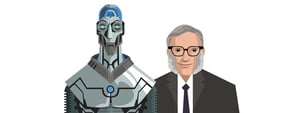Space travel, robots, galactic empires: these are the extraordinary scenes that fill the pages of the books by Isaac Asimov, one of the great masters of science fiction.
Asimov’s appeal lies in an incredibly successful mix of literary talent and scientific knowledge (he was a professor of biochemistry), capable of perfectly describing the imaginary worlds that would have become reality thanks to technological progress. He is the one that invented the word “robotics” and the one that created its three well-known laws, which still remain a point of reference for ethically defining the rules for using Artificial Intelligence: when we speak of “human-machine interaction”, we are using a conceptual category invented by Asimov.
The debt we owe him is evident when we think about a multi-disciplinary approach to scientific research, in which experimental science can happily co-exist alongside social and cognitive science.
Actually, in hindsight, to define Asimov as a science-fiction writer is over-simplistic.
Alongside his narrative works, Asimov produced an impressive amount of publications that, to this day, remain a model of how to spread scientific knowledge: each explanation is as compelling and enthralling as a novel, but completely thorough and reliable.
In a well-known article published in 1967, “Time” magazine, called him “The translator”, presenting him as, “No emissary to the non-scientific world has been more successful than a highly-articulate biochemist named Isaac Asimov”.
Asimov particularly loved popular science, because he considered it to have almost infinite scope, a world that we have to continuously return to in order to account for the new discoveries destined to change our vision of the world.
The astronomer Carl Sagan considered him to be “the best scientific disseminator of our time” and wrote of him, “It will never be known how many practicing scientists today, in how many countries, owe their initial inspiration to a book, article, or short story by Isaac Asimov, nor in how many simple citizens he created an interest in scientific adventure”.
This admiration was also shared by the great science-fiction writers: “Isaac Asimov stood for knowledge against superstition, tolerance against bigotry, kindness against cruelty – above all, peace against war””, said his “colleague” Arthur C. Clarke, author of “2001: A Space Odyssey”.
Exactly one hundred years from his birth (January 2, 1920), Asimov still has a lot to teach us.

